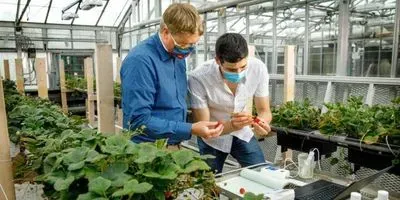
ITHACA, NY — Fueled by year-round market demand for local food and by advancements in greenhouse technology, controlled environment agriculture (CEA) is a rapidly growing field. In this intensive form of agriculture, plants are grown in a controlled environment, such as a greenhouse, to efficiently produce fresh, high-quality fruits and vegetables.
However, commercial CEA requires an advanced knowledge of both plant biology and complex infrastructure. And while New York state ranks fourth in the nation for CEA production value, the workforce hasn't been able to keep pace with industry growth.
Now, thanks to a $496,000 grant from the U.S. Department of Agriculture's National Institute of Food and Agriculture (NIFA), two horticulture experts at Cornell University will help design new CEA training programs to build a skilled workforce pipeline for the industry.
"Growers consistently state that finding well-trained personnel to operate their facilities is among the largest barriers to expansion," said Neil Mattson, associate professor of horticulture. "This project uses a targeted approach to determine what skill sets are most critical, and it develops several pathways for training—both for traditional college students and for the professional development of existing employees."
He and Anu Rangarajan, director of the Cornell Small Farms Program, will collaborate with industry leaders, Ohio State University and its Agricultural Technical Institute, and SUNY Broome Community College to develop a technical training certificate in CEA production. They also plan to create a two-year Associate of Applied Science degree for students enrolled in those schools and for other community colleges to integrate into their curriculum.
Related Article: Growing Hydroponic Strawberries in the Desert
Participants will gain experience with CEA infrastructure, such as hydroponics, aeroponics, and aquaculture. They will also develop advanced knowledge in environmental monitoring, pest management, food safety, and marketing skills.
Rangarajan already oversees numerous training programs and has spent the last five years working with commercial urban agriculture operations to better understand the key factors that influence farm viability. As part of the new project, she will lead the development of an online delivery platform for the new programming.
Mattson's current research includes using energy-efficient LED lighting for sustainable greenhouse production and studying the long-term viability of indoor urban agriculture. His role in the NIFA project involves collaborating with industry partners to develop the new learning modules.
In addition to supporting more local and sustainable food systems, Rangarajan said the work they've done thus far has been essential for learning how to provide more skilled-training opportunities for new farmers.
"Our efforts have laid the groundwork," she said, "for what I hope will be a dynamic training program that will build the workforce and elevate the industry as a whole."
- This press release was originally published on the Cornell Chronicle











